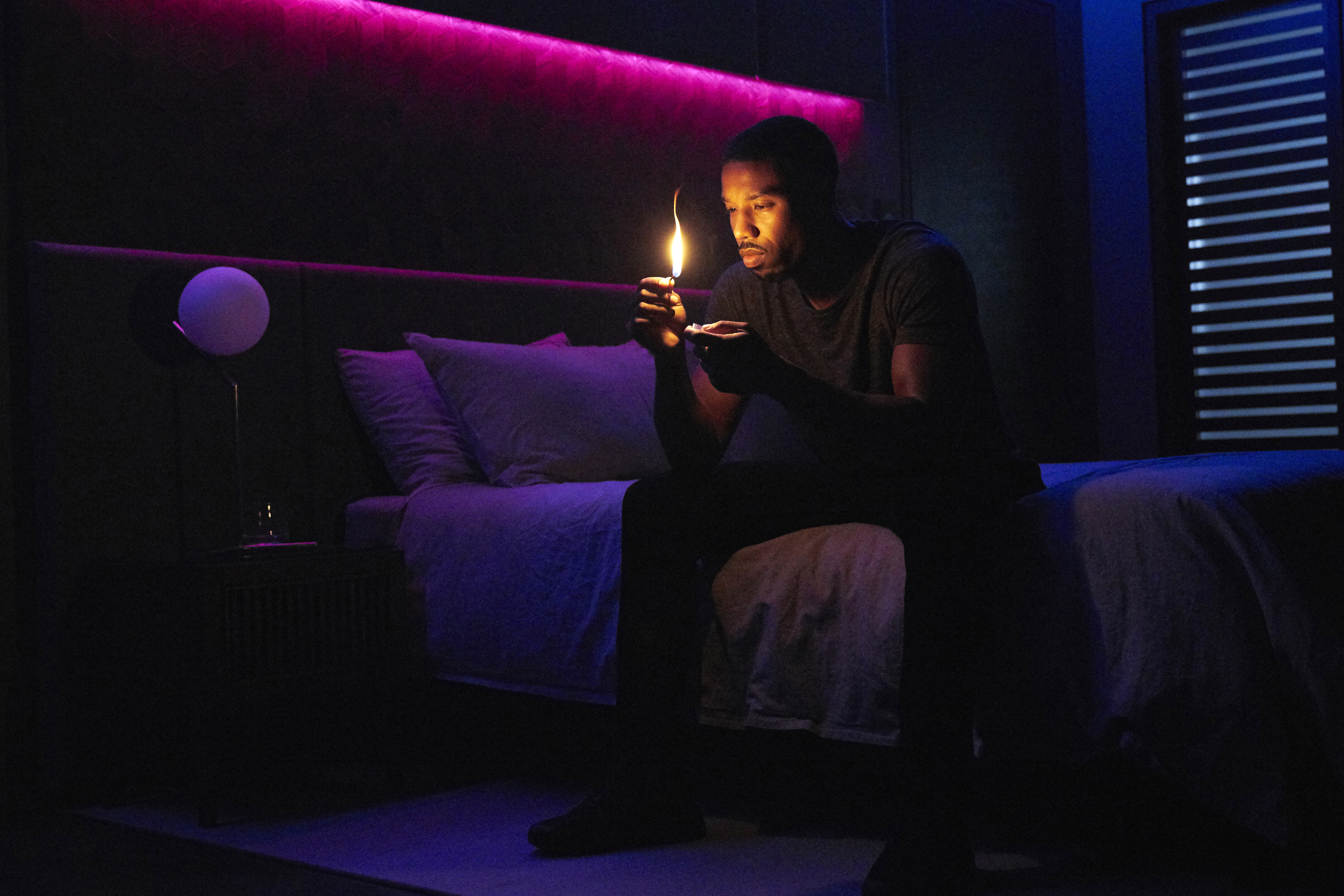The world-burning of Michael B. Jordan
In Fahrenheit 451 and beyond, the acclaimed young actor is ready to burn it all down


A free daily email with the biggest news stories of the day – and the best features from TheWeek.com
You are now subscribed
Your newsletter sign-up was successful
Some men, as the saying goes, just want to watch the world burn. Michael B. Jordan may not be one of these men — but he sure seems to enjoy playing them.
In a three-month span, Jordan has portrayed two characters with literal and figurative penchants for fire. In February, he brought Erik "Killmonger" Stevens to life in Ryan Coogler's blockbuster Black Panther, while his turn as Guy Montag in Ramin Bahrani's Fahrenheit 451 will premiere Saturday. Both characters are prone to incineration. But while Montag begins as an agent of the system, using literal flames to solidify the government's stranglehold on its citizens, Killmonger is out to burn it all down.
Montag, the conflicted hero of Fahrenheit 451, Ray Bradbury's 1953 novel turned HBO film, lives in a future dystopian society where books are unilaterally designated as "graffiti" and banned by the government. Any books found are subject to immediate burning by "firemen," who are essentially stormtroopers deployed to enforce the state's totalitarian regime.
The Week
Escape your echo chamber. Get the facts behind the news, plus analysis from multiple perspectives.

Sign up for The Week's Free Newsletters
From our morning news briefing to a weekly Good News Newsletter, get the best of The Week delivered directly to your inbox.
From our morning news briefing to a weekly Good News Newsletter, get the best of The Week delivered directly to your inbox.
Montag genuinely loves fire. It's the tool of his trade and an outlet for his natural showmanship. "Damn, it's a pleasure to burn!" he proclaims, as he and his fellow firemen light up a cache of "graffiti." And burn he does. He's a walking incinerator — and a flashy one, playing to his peers as well as to folks watching live via state-run internet.
Meanwhile, deep into Black Panther, Killmonger claims the throne of Wakanda, the sovereign African nation serving as the film's main setting. After he consumes the Heart-Shaped Herb, a mystical plant that imbues him with enhanced physical prowess, he adopts the mantle of the Black Panther, chief and protector of Wakanda and its tribes. But Killmonger isn't a protector — he's a conqueror. And so he has his attendants torch the rest of the crop. "Burn it all!" he commands. He's talking about the herb, but he might as well be talking about the Wakandan world order, too.
Killmonger seeks to upset the establishment. Montag maintains it. But both use flames as the apparatus of their office.
Now, Montag doesn't remain a loyal, unquestioning fireman forever. He is forced to confront his role when a job goes sideways: After discovering a veritable treasure trove of books, kept hidden by one lone woman, he prepares to burn them all — until the woman beats him to the punch and ignites herself along with the books while Montag watches in slack horror. Still, Montag is only a revolutionary in the making, while Killmonger is a full-fledged revolutionary.
A free daily email with the biggest news stories of the day – and the best features from TheWeek.com
Pyromania is a wonderful bridge for Jordan's select filmography (recall when he played Johnny Storm, the Human Torch, in Josh Trank's ill-fated Fantastic Four reboot in 2015) — but on a larger scale, it's the fight for social change that defines Jordan's career.
To date, Jordan has served as Coogler's go-to leading man in a loosely connected trilogy of films about lost boys: first, 2013's Fruitvale Station, then 2015's Creed, and most recently Black Panther. Killmonger's arc is considerably more radical than that of Fruitvale Station's Oscar Grant, who was murdered by a Bay Area Rapid Transit officer on New Year's Day 2009, and much larger in scale than that of Creed's Adonis "Donnie" Johnson, who wants to prove himself not only as a boxer, but as a man.
All the same, there's kinship between them — three young black men neglected, disregarded, or flat-out executed by American authority. When Killmonger excoriates Wakanda's governors for their failure to stand up for black people in America, he might as well be talking about Grant and Johnson.
Neither Grant nor Johnson set the world on fire, but they did supply the kindling for Killmonger and Montag's rebellions against oppressive power structures. And Jordan, it seems, is no longer content with sparks. With Black Panther and Fahrenheit 451, he has his heart set on infernos.
Bostonian culture journalist Andy Crump covers the movies, beer, music, and being a dad for way too many outlets, perhaps even yours: Paste Magazine, The Playlist, Mic, The Week, Hop Culture, and Inverse, plus others. You can follow him on Twitter and find his collected writing at his personal blog. He is composed of roughly 65 percent craft beer.
-
 The environmental cost of GLP-1s
The environmental cost of GLP-1sThe explainer Producing the drugs is a dirty process
-
 Greenland’s capital becomes ground zero for the country’s diplomatic straits
Greenland’s capital becomes ground zero for the country’s diplomatic straitsIN THE SPOTLIGHT A flurry of new consular activity in Nuuk shows how important Greenland has become to Europeans’ anxiety about American imperialism
-
 ‘This is something that happens all too often’
‘This is something that happens all too often’Instant Opinion Opinion, comment and editorials of the day
-
 Walter Isaacson's 'Elon Musk' can 'scarcely contain its subject'
Walter Isaacson's 'Elon Musk' can 'scarcely contain its subject'The latest biography on the elusive tech mogul is causing a stir among critics
-
 Welcome to the new TheWeek.com!
Welcome to the new TheWeek.com!The Explainer Please allow us to reintroduce ourselves
-
 The Oscars finale was a heartless disaster
The Oscars finale was a heartless disasterThe Explainer A calculated attempt at emotional manipulation goes very wrong
-
 Most awkward awards show ever?
Most awkward awards show ever?The Explainer The best, worst, and most shocking moments from a chaotic Golden Globes
-
 The possible silver lining to the Warner Bros. deal
The possible silver lining to the Warner Bros. dealThe Explainer Could what's terrible for theaters be good for creators?
-
 Jeffrey Wright is the new 'narrator voice'
Jeffrey Wright is the new 'narrator voice'The Explainer Move over, Sam Elliott and Morgan Freeman
-
 This week's literary events are the biggest award shows of 2020
This week's literary events are the biggest award shows of 2020feature So long, Oscar. Hello, Booker.
-
 What She Dies Tomorrow can teach us about our unshakable obsession with mortality
What She Dies Tomorrow can teach us about our unshakable obsession with mortalityThe Explainer This film isn't about the pandemic. But it can help viewers confront their fears about death.
